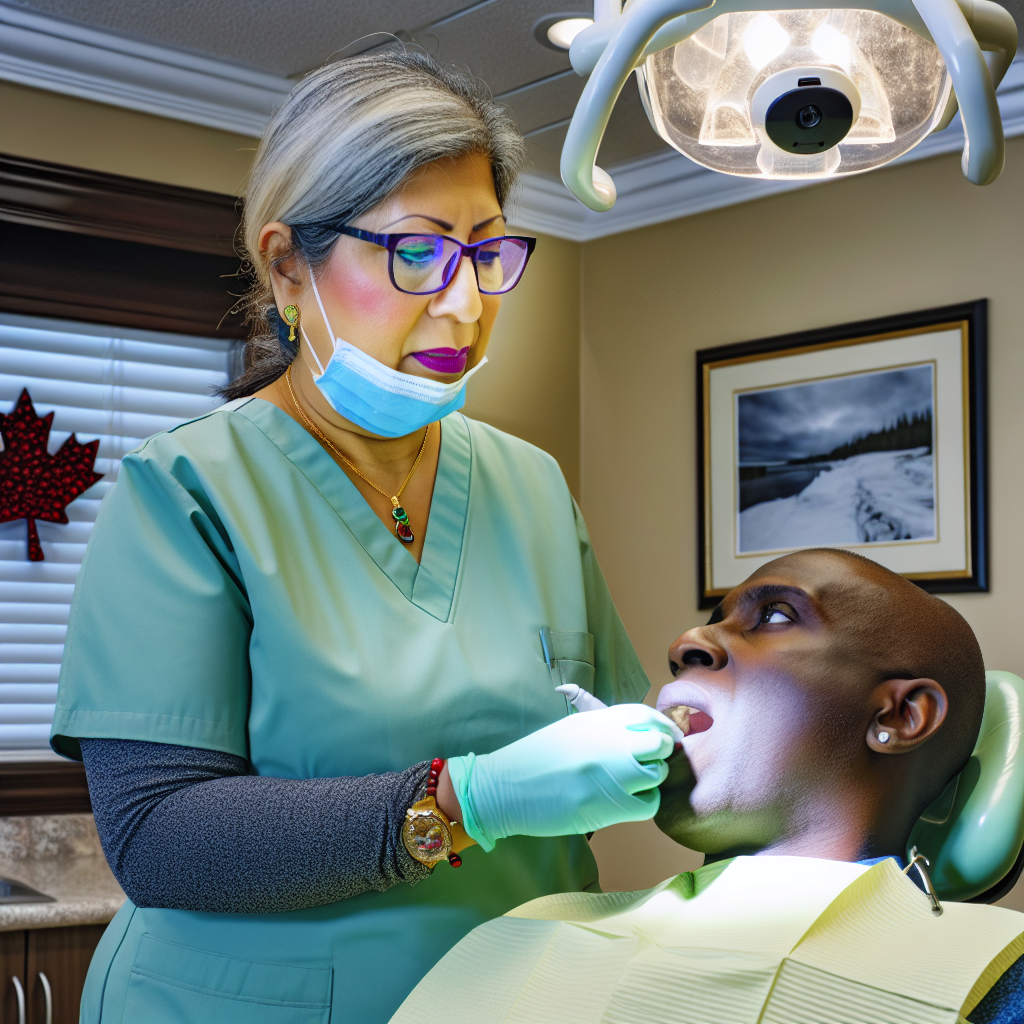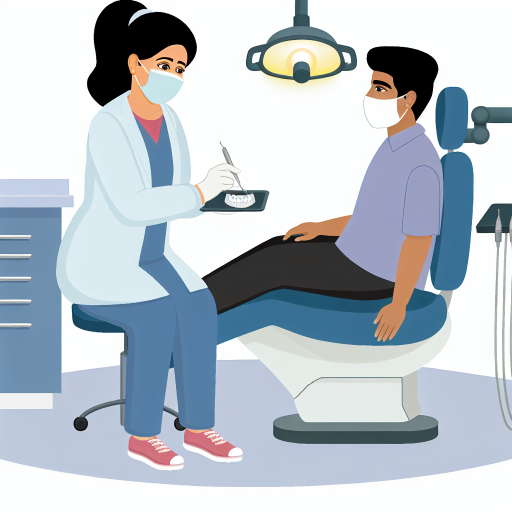Understanding the Role of a Trusted Dentist in Patient Care
Building Trust Through Communication
Effective communication is vital in establishing trust with patients.
Patients expect their dentist to listen to their concerns carefully.
Moreover, clear explanations about procedures can alleviate anxiety.
In addition, providing information about treatment options empowers patients.
Ensuring Quality Care and Professional Standards
Patients want dentists who adhere to high-quality care guidelines.
They expect clinics to maintain cleanliness and hygienic practices.
Furthermore, dentists should stay updated with the latest techniques.
Continuing education reflects a commitment to professional development.
Personalized Treatment Plans
Every patient has unique dental needs and expectations.
Trusted dentists create individualized treatment plans accordingly.
Patients appreciate when their input is considered during this process.
This personal touch fosters a strong patient-dentist relationship.
Comprehensive Patient Education
Patients expect their dentists to provide educational resources.
Informing them about proper oral hygiene practices is crucial.
Additionally, discussing prevention strategies promotes better health.
Informed patients tend to take more responsibility for their dental care.
Accessible and Responsive Care
Convenient appointment scheduling is important for patients.
Moreover, quick responses to inquiries build patient confidence.
Online booking systems enhance accessibility for modern patients.
Being approachable also encourages patients to voice their concerns.
Key Qualities Patients Seek in a Dentist
Compassion
Patients value compassion in their dental care providers.
They seek professionals who understand their fears and anxieties.
A compassionate dentist listens and responds to patients’ concerns.
This approach fosters trust and a positive patient experience.
Additionally, compassion encourages patients to seek routine care.
Unlock Your Career Potential
Visualize a clear path to success with our tailored Career Consulting service. Personalized insights in just 1-3 days.
Get StartedSkill
Patients expect their dentist to possess honed clinical skills.
Expertise directly affects treatment outcomes and patient satisfaction.
A skilled dentist stays updated with the latest techniques and technologies.
Moreover, patients appreciate a thorough knowledge of different procedures.
Expertise builds confidence and reassures patients during appointments.
Communication
Effective communication is crucial in a dentist-patient relationship.
Patients want clear explanations about their treatments and procedures.
A dentist should simplify complex medical jargon for better understanding.
Open dialogue encourages patients to express their concerns comfortably.
This practice leads to better decision-making and improved adherence to care plans.
The Importance of Transparency and Honesty in Dental Practices
Understanding Patient Expectations
Patients seek transparency from their dentists.
They desire clear communication regarding their treatment options.
Honesty builds trust, which forms the foundation of effective dental care.
Open Communication Channels
Effective dentists encourage open dialogues with their patients.
They explain procedures in straightforward language.
Moreover, they welcome questions and address concerns promptly.
Clear Cost Breakdown
Patients appreciate knowing the costs associated with their treatments.
Providing a detailed cost breakdown fosters trust.
Furthermore, it prevents surprises regarding financial obligations.
Informed Consent Process
An informed consent process is crucial in dental practices.
Dentists should discuss potential risks and benefits of treatments.
This approach empowers patients to make educated decisions.
Staying Current with Best Practices
Trusted dentists stay updated with the latest dental advancements.
They should share this information with their patients regularly.
This practice demonstrates a commitment to high-quality care.
Building Long-Term Relationships
Honesty and transparency foster long-term patient relationships.
Patients feel valued and respected when their dentists are upfront.
Ultimately, this approach leads to higher patient satisfaction and loyalty.
Gain More Insights: What Does a Dentist Really Do? A Career Overview
Patient Comfort and the Dental Experience
Creating a Welcoming Environment
A welcoming atmosphere sets the tone for the dental visit.
Patients appreciate a clean and organized office space.
Friendly reception staff make a significant first impression.
Comfortable seating can help alleviate anxiety before appointments.
Natural light and calming decor contribute to a relaxing environment.
Empathetic Communication
Effective communication fosters trust between patients and dentists.
Patients expect their dentist to actively listen to their concerns.
Using clear language to explain procedures helps ease anxiety.
Moreover, dentists should encourage questions for better understanding.
Personalized Care
Patients desire personalized treatment plans tailored to their needs.
Customizing care can lead to improved patient satisfaction.
Additionally, understanding unique health histories is crucial.
Patients want dentists to respect their preferences and choices.
Advanced Technology and Techniques
Patients expect dental practices to utilize modern technology.
Advanced tools can enhance the accuracy of diagnoses and treatments.
Technological advancements can lead to less invasive procedures.
Moreover, effective use of technology can shorten appointment times.
Follow-Up and Support
Post-treatment follow-up shows patients they are valued.
Patients expect timely communication regarding recovery and care instructions.
Access to support after procedures enhances the overall experience.
Furthermore, clear channels for reporting any concerns are essential.
Transparent Pricing and Insurance Information
Patients appreciate transparency regarding treatment costs.
Detailed information about payment options fosters trust.
Insurance coverage should be clearly explained to avoid surprises.
Ultimately, clear pricing policies contribute to patient satisfaction.
Gain More Insights: From Pharmacists to Dietitians: Canada’s Top Allied Health Careers Explored
How Dentists Can Build Trust Through Patient Education and Involvement
The Importance of Communication
Effective communication is key in establishing trust with patients.
Patients appreciate clear and concise explanations of procedures.
Additionally, dentists should encourage patients to ask questions.
This dialogue fosters a sense of involvement and transparency.
Providing Comprehensive Education
Educational resources empower patients in their oral health journeys.
Dentists can create brochures or online content on common procedures.
Videos demonstrating techniques can also enhance understanding.
Moreover, interactive sessions can keep patients engaged.
Encouraging Patient Participation
Involving patients in decision-making builds their confidence.
Patients should feel they have a say in their treatment plans.
Addressing their concerns shows that their opinions matter.
Furthermore, involving them in preventative strategies enhances compliance.
Fostering a Welcoming Environment
A welcoming environment makes patients feel safe and valued.
Staff should be friendly and accessible to encourage open dialogue.
Caring attitudes and professionalism promote a positive experience.
Dentists can also invest in comfortable settings for treatments.
Utilizing Technology for Better Engagement
Leveraging technology can enhance communication with patients.
Online portals allow patients to access their dental records easily.
Sending reminders for appointments helps reduce no-shows.
Telehealth options provide convenient access to consultations.
Providing Follow-Up Care and Feedback Opportunities
Follow-up care shows patients that their well-being is a priority.
Post-treatment calls or emails for feedback strengthen provider-patient relationships.
Additionally, gathering patient feedback can identify areas for improvement.
Finally, showing responsiveness to feedback reinforces trust.
See Related Content: Why Remote Healthcare Jobs Are the Next Big Thing in Canada

The Role of Technology in Enhancing Patient Trust and Satisfaction
Digital Communication and Transparency
Digital communication creates a direct line with patients.
This approach ensures patients feel heard and valued.
Moreover, transparent communication builds trust from the outset.
Patients appreciate timely updates and reminders about appointments.
Additionally, online platforms facilitate easy access to treatment information.
Innovative Diagnostic Tools
Advanced diagnostic tools help dentists provide accurate assessments.
Technology like 3D imaging allows for better treatment planning.
Furthermore, these tools enhance patient understanding of their oral health.
When patients see their conditions in detail, they feel more informed.
This clarity fosters greater trust between patients and dentists.
Patient-Centric Treatment Plans
Technology enables dentists to create personalized treatment plans.
These tailored plans consider individual patient needs and preferences.
Patients appreciate a customized approach to their dental care.
Additionally, involving patients in decision-making increases satisfaction.
They feel empowered when they actively participate in their health journey.
Improved Comfort and Convenience
Advancements in dental technology enhance patient comfort during procedures.
For instance, laser dentistry minimizes discomfort and healing time.
Moreover, virtual reality can distract patients during treatments.
Such innovations make visits to the dentist less stressful.
Convenient booking options online also contribute to a positive experience.
Post-Treatment Follow-Up
Technology offers efficient post-treatment follow-ups for dental patients.
Automated emails or texts remind patients of care instructions.
Furthermore, telehealth options allow quick consultations for any concerns.
This proactive follow-up reinforces patients’ trust in their care providers.
Hence, it ensures ongoing engagement between patients and dentists.
See Related Content: Why Canada’s Aging Population is Driving Demand for Geriatric Healthcare Jobs
Handling Patient Concerns and Fears
Understanding Patient Anxiety
Many patients experience anxiety before dental visits.
This fear often stems from previous negative experiences.
Furthermore, lack of understanding about procedures increases concerns.
Recognizing these factors helps dentists address patient fears effectively.
Open Communication
Establishing open communication builds trust with patients.
Encouraging patients to voice their concerns is essential.
Take time to listen actively during consultations.
Clarify misconceptions about treatments and procedures.
Providing Information
Providing clear information eases patient anxiety.
Explain each step of the dental procedure beforehand.
Use visual aids to illustrate complex procedures.
Moreover, discussing benefits helps patients feel more informed.
Creating a Comforting Environment
A welcoming atmosphere reduces patient stress levels.
Consider the decor and layout of the dental practice.
Soft lighting and calming colors contribute positively.
Provide comfortable seating and soothing background music.
Offering Sedation Options
For highly anxious patients, suggest sedation dentistry.
Explain the different types of sedation available.
Ensure patients understand the safety of these options.
Moreover, discuss potential side effects transparently.
Building Trust Through Professionalism
Trust is a key component of a successful patient-dentist relationship.
Demonstrate professionalism in every interaction.
Ensure all staff members exhibit friendliness and empathy.
Follow through on promises, reinforcing trustworthiness.
Regular Follow-ups
Follow-up calls after treatments show genuine care.
Ask about patient experiences and address any concerns.
This practice helps strengthen the relationship over time.
Additionally, it reinforces the importance of their feedback.
Feedback Mechanisms: How Patients Want Their Voices Heard
Understanding Patient Needs
Patients seek a safe space to express their concerns.
They desire prompt attention to their feedback and suggestions.
Moreover, patients appreciate clarity in communication with their dentists.
Preferred Communication Channels
Many patients prefer using online platforms for feedback.
Emails allow for detailed sharing of experiences.
Social media serves as a public forum for expressing opinions.
Phone calls offer a personal touch for immediate concerns.
Feedback Mechanisms That Work
Surveys can effectively gauge patient satisfaction.
Post-appointment feedback forms encourage honest reviews.
In-person discussions create opportunities for real-time feedback.
Importance of Follow-Up
Patients expect acknowledgment of their feedback.
Timely responses build trust between patients and dentists.
Future appointments should reflect any issues addressed.
Creating an Open Dialogue
Regular discussions enhance understanding of patient expectations.
Open forums foster a community where patients feel valued.
Encouraging patient involvement helps shape office policies.
Additional Resources
Guidance Document For Clinical Trial Sponsors: Clinical Trial …




